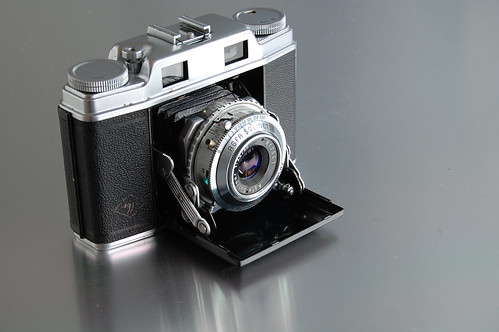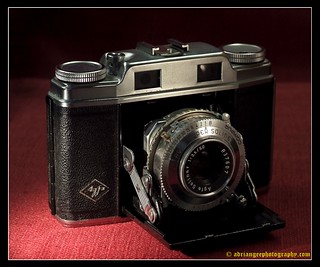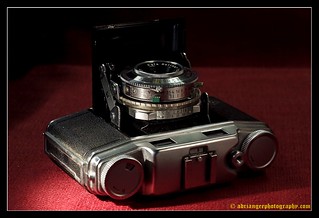Difference between revisions of "Super Solinette"
m (fixe dlink) |
m |
||
| Line 12: | Line 12: | ||
|} | |} | ||
| − | The '''Super Solinette''' is a folding 35mm camera made by [[Agfa]] in the mid-1950s (1953-58). It is a continuation of the [[Solinette]] line, where "Super" designates a model including a coupled [[rangefinder (device)|rangefinder]]. The Agfa Super Solinette was also sold in the US as the '''[[Ansco Super Regent]]''' | + | The '''Super Solinette''' is a folding 35mm camera made by [[Agfa]] in the mid-1950s (1953-58). It is a continuation of the unit focusing [[Solinette]] line, where "Super" designates a model including a coupled [[rangefinder (device)|rangefinder]]. The Agfa Super Solinette was also sold in the US as the '''[[Ansco Super Regent]]''' |
This folding camera is similar in the design to the larger [[Isolette]] [[120 film]] cameras. With a pleasing symmetrical design and circular knobs for film advance and rewind. | This folding camera is similar in the design to the larger [[Isolette]] [[120 film]] cameras. With a pleasing symmetrical design and circular knobs for film advance and rewind. | ||
| Line 18: | Line 18: | ||
Super Solinettes came in several combinations of lenses and shutters, most use the top of the line 50mm/3.5 [[Solinar]] (4 elements in 3 groups) but some are reported to have Apotar lenses. The diaphragm iris has 10 blades, providing an almost circular shape which produces very pleasing out of focus area. | Super Solinettes came in several combinations of lenses and shutters, most use the top of the line 50mm/3.5 [[Solinar]] (4 elements in 3 groups) but some are reported to have Apotar lenses. The diaphragm iris has 10 blades, providing an almost circular shape which produces very pleasing out of focus area. | ||
Like her sister [[Solinette]] the focusing is done by moving the whole front unit; by rotating a serrated dial at the base of the shutter/lens assembly, in the super Solinette, a coupled rangefinder helps with focusing from 1m (3.5ft) to infinity. | Like her sister [[Solinette]] the focusing is done by moving the whole front unit; by rotating a serrated dial at the base of the shutter/lens assembly, in the super Solinette, a coupled rangefinder helps with focusing from 1m (3.5ft) to infinity. | ||
| − | + | The film transport is a step backwards when compared to the '''[[Karat|AGFA Karat]]''' which had a one-stroke lever, and the rangefinder is a more conventional superimposed circle. | |
| − | The film transport is a step backwards when compared to the ''' | + | Shutter must be cocked by hand, and a has a double exposure prevention system. |
Early models used a Synchro-Compur shutter with Speeds from 1/500-1s and B, self timer and X and M flash sync and had ''Solinette'' in the front plate markings, in these cameras the f/stops are stepless. | Early models used a Synchro-Compur shutter with Speeds from 1/500-1s and B, self timer and X and M flash sync and had ''Solinette'' in the front plate markings, in these cameras the f/stops are stepless. | ||
| − | Later models used a Synchro-Compur LVS shutter, which implemented a EV system | + | Later models used a Synchro-Compur LVS shutter, which implemented a EV system, where shutter speed and f/numbers move together, and had ''Super Solinette'' marked in the front plate. |
Unfolding is performed by pressing a button on the left side, opposed to the top on the [[Solinette]]. Once unfolded, the lens bed is quite rigid, as it is locked in place by 2 struts. The camera can be set on tables or other surfaces for long exposures. | Unfolding is performed by pressing a button on the left side, opposed to the top on the [[Solinette]]. Once unfolded, the lens bed is quite rigid, as it is locked in place by 2 struts. The camera can be set on tables or other surfaces for long exposures. | ||
Revision as of 19:48, 8 May 2023
Early model |
The Super Solinette is a folding 35mm camera made by Agfa in the mid-1950s (1953-58). It is a continuation of the unit focusing Solinette line, where "Super" designates a model including a coupled rangefinder. The Agfa Super Solinette was also sold in the US as the Ansco Super Regent
This folding camera is similar in the design to the larger Isolette 120 film cameras. With a pleasing symmetrical design and circular knobs for film advance and rewind.
Super Solinettes came in several combinations of lenses and shutters, most use the top of the line 50mm/3.5 Solinar (4 elements in 3 groups) but some are reported to have Apotar lenses. The diaphragm iris has 10 blades, providing an almost circular shape which produces very pleasing out of focus area. Like her sister Solinette the focusing is done by moving the whole front unit; by rotating a serrated dial at the base of the shutter/lens assembly, in the super Solinette, a coupled rangefinder helps with focusing from 1m (3.5ft) to infinity. The film transport is a step backwards when compared to the AGFA Karat which had a one-stroke lever, and the rangefinder is a more conventional superimposed circle. Shutter must be cocked by hand, and a has a double exposure prevention system.
Early models used a Synchro-Compur shutter with Speeds from 1/500-1s and B, self timer and X and M flash sync and had Solinette in the front plate markings, in these cameras the f/stops are stepless. Later models used a Synchro-Compur LVS shutter, which implemented a EV system, where shutter speed and f/numbers move together, and had Super Solinette marked in the front plate.
Unfolding is performed by pressing a button on the left side, opposed to the top on the Solinette. Once unfolded, the lens bed is quite rigid, as it is locked in place by 2 struts. The camera can be set on tables or other surfaces for long exposures.
|
|
Notes:
- Bellows is usually made of leather; pay attention to it as it tears in the corners.
- Also the bellows can get pinched in the edge during folding and can tear at the camera side
- Focusing unit might be stiff, due to the grease in the helicoid hardening (Agfa grease problem).
- It takes patience, solvent and lots q-tips to loosen it.
- Rangefinder adjustment is possible and requires lifting the top cover; which is achieved by loosening both rewind and advance dials.
- The double-shot prevention is very finicky, and has many small parts, don't force it or it can be ruined.
Links
- Super Solinette User manual at Mike Butkus' OrphanCameras.com
- Agfa Super Solinette page at Mike Elek's A Classis Camera Portfolio
- Agfa Super Solinette page at Retina Rescue


